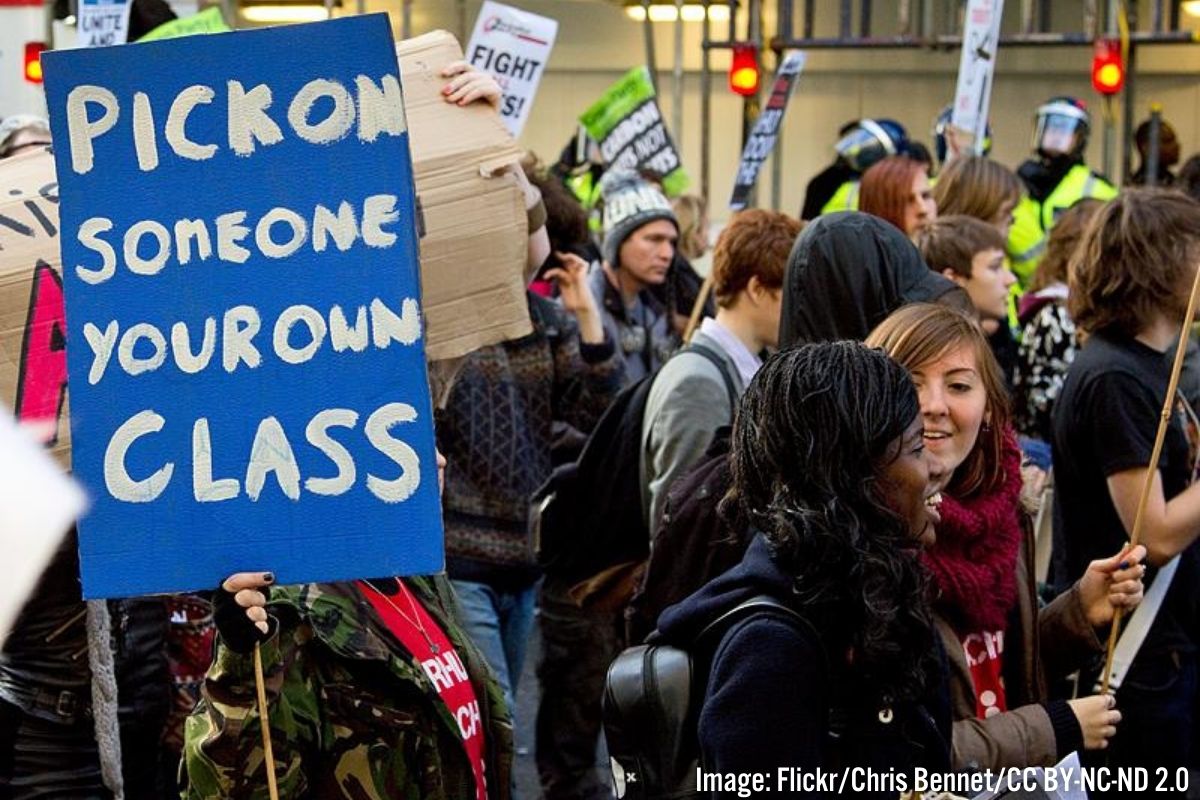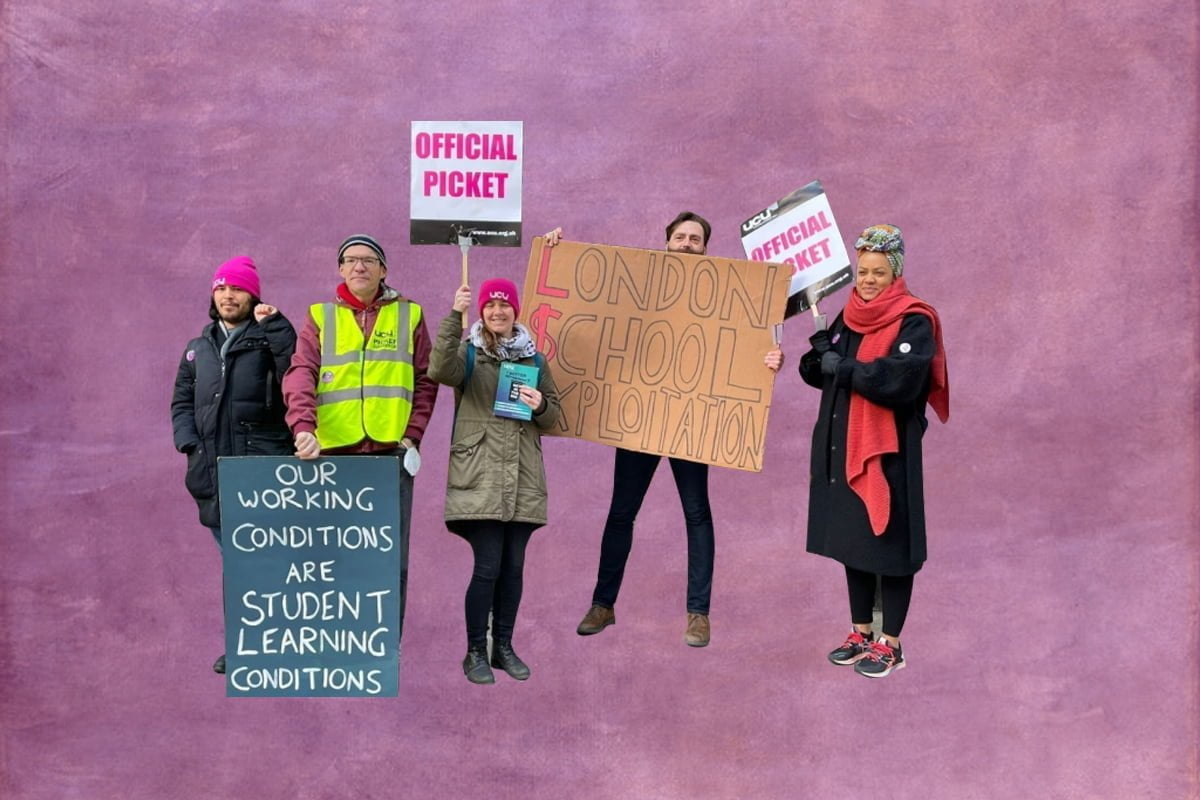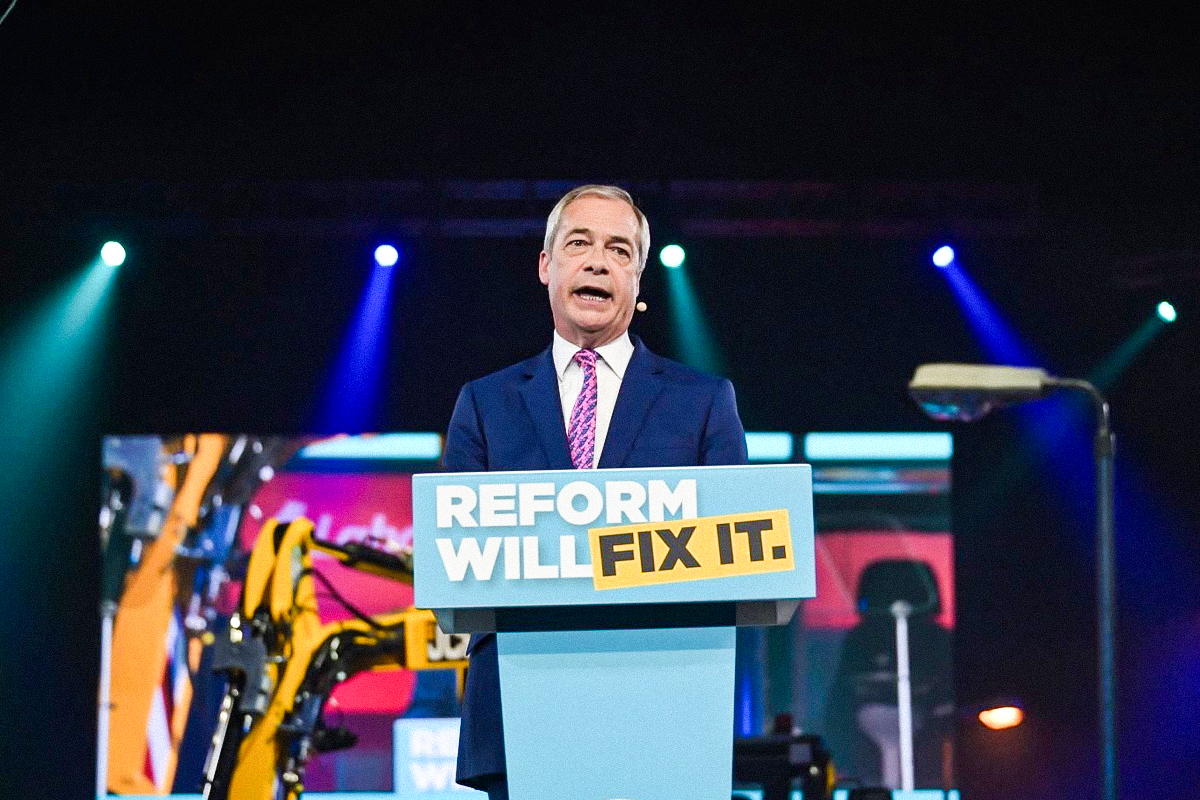University staff in the UCU are in the middle of their latest wave of strike action against attacks on pensions, pay, and conditions. But education bosses are digging their heels in. Only escalated action can secure victory for the workers.
UCU members have been on picket lines across the country since 10 days of strike action began on 14 February, Valentine’s Day. Members’ attitude to university management has been far from loving, however.
As if a new round of swingeing attacks – following a difficult two years of pandemic conditions – wasn’t enough, the employers have only become more entrenched and bloody-minded since the strike began.
In response, UCU members are prepared to escalate the struggle significantly. The question now is whether the union leadership will rise to meet the challenge.
Pension robbery

Before the strike began, UCU leaders proposed a possible compromise to temporarily resolve the dispute.
This offer was an unnecessarily generous attempt on the part of the union leadership to avoid necessary strike action. It was welcomed by the pension scheme managers themselves, who said it was practicable. But when it was put out to the employers’ body (UUK), they almost unanimously voted down the proposal.
As such, the pension counter-reforms were voted through on 22 February, and will take effect in April.
The focus of the union is now on forcing a new valuation of the pension scheme, through which UCU can demonstrate that these attacks are unnecessary. This demand should be linked to demands to change the governance of the pension scheme, which is currently run by and for the bosses.
If staff were to have control of our own pension pot, we could point out that: the sector has reserves of £46.8 billion; the pension fund’s deficit has shrunk by 80%; and its assets have grown to £90 billion.
All of the bosses’ excuses for their attacks on USS pensions have now been utterly rubbished. The current struggle is exposed as a class struggle, and not just a technical disagreement.
Bosses attack
It is now clear that university employers are trying to break the union, and to utterly subordinate staff in higher education (HE) to the kinds of conditions we see across the private sector, where workers are ruthlessly exploited for the profit of a few.
Just as vice-chancellors behave (and are paid) like corporate CEOs, so lecturers and support staff are subject to the same conditions that affect workers in every other sector: low pay, poor pensions, and no respect.
Some employers have communicated this agenda especially clearly by taking a punitive approach to wage deductions. Universities such as Queen Mary’s in London and the University of Birmingham have deducted 100% of pay from staff who have been participating in action short of strike (ASOS).
In other words, workers who have said that they will only work the hours to which they are contracted are scandalously being docked their full pay for doing so!
Clearly the UCU cannot stand for this, and nor should other unions in the sector. Any instance of these kinds of abuses should be responded to with immediate strike action. If bosses won’t pay UCU members, then our members should stop working!
For indefinite action!
Local solutions are clearly not enough, however. As UCU Marxists have explained for some time, this dispute will not be resolved by partial action or routine protest.
The mood on pickets has only become more angry and determined since the strike began, and with the mandate for strikes running out, UCU leaders should be preparing the union for an all-out strike.
UCU Marxists – supporters of Socialist Appeal inside the union – have been discussing this call with colleagues on picket lines around the country, and it has won a clear echo.
Our comrades proposed a motion in favour of indefinite action in the University of Sheffield branch, and the motion passed. We have also heard reports that similar motions calling for an all-out strike have passed in other UCU branches across the country.
We are urging all UCU members who are critical of the current strategy to take up this motion and propose it in your branches. Only with rapid and effective escalation to indefinite action will this dispute be won.
BREAKING: Yesterday members at the University of Sheffield UCU Branch passed a motion calling for the national escalation of the ongoing strike action to indefinite strike action as soon as possible. 1/8
— UCU Marxists (@ucumarxists) February 23, 2022
Model motion: For indefinite strike action!
This branch notes that:
- Workers in the UK are currently facing a cost of living crisis, with inflation climbing to a 30 year high of 5.5% at the start of this year. Ofgem has estimated energy bills will rise by 40% in April, driven by a record rise in global gas prices.
- Workers in other parts of the public sector have defended themselves using the tactic of indefinite strike action and won through its use. For example outsourced cleaners, caters, and porters at St. Mary’s Hospital, West London, in January 2020.
- The UCU is not isolated in this fight and already has students and other unions fighting alongside. The National Union of Students has called a national ‘Student Strike for Education’ on 2 March. And Unison members at nine higher education institutions are to take industrial action on the current year’s pay offer with dates set for 28 February to 2 March.
- The current disputes have been open since 2018 and the employers have shown no indication of resolving them.
This branch believes that:
- It is vital that this latest round of UCU strikes is successful given the cost of living crisis developing in the UK.
- The use of escalating strike action is now well understood by the employers. They know that they can drag out negotiations until the mandate runs out.
- Indefinite strike action is not a tactic to be raised lightly, but it is a serious escalation that sends a clear message to UUK, USS, and UCEA that the union is determined to win these demands.
- Furthermore if action is taken alongside students this would cut across the ‘divide and rule’ tactics of university bosses, and could lead to a complete shutdown of campuses – especially if efforts are made to involve other unions in higher education.
This branch resolves to:
- Push for the national escalation of the ongoing strike action to indefinite strike action as soon as possible.
- Send delegates to any national meeting of branches with a mandate to propose and argue for indefinite strike action.
- Push for the UCU to nationally appeal to other unions in the higher education sector to ballot their members so that strike action can be coordinated to maximise the pressure on the employers.
(3) Further action: clear majority for well thought-out escalating action of some form.
Around 10 branches in favour of moving to ‘indefinite’ action with opt out option over Easter vacation. Followed by the ‘9 days’ plan. With a few branches for the 5 days on a regional basis
— UCU West Midlands Region (@WestMidsUCU) February 24, 2022
Strike report from London
Marxist Student Federation
As part of the national strike, UCU London region organised a rally and demo on Tuesday afternoon (22 February) starting at Tavistock Square.
Over 400 UCU members and students gathered to protest in defence of fair and equal pay, against the pension robbery, for manageable workloads, and for an end to casualisation.
Rally
To kick off the protest, a number of speeches were made by UCU members, trade unionists, and students.
Paul Holmes, president of Unison, the largest union in Britain, was one of the main speakers. Despite the rain and wind, his speech enthused and motivated the crowd. “Somebody wants your terms and conditions, your pay, your pension, to enhance their lifestyle!” Paul said to cheers.
Another speaker at the demo said, “They know the cost of education, but not the value of education.” This was later chanted by protestors on the streets of London.
A member of staff from Great Ormond Street Hospital, organised with United Voices of the World, gathered the most amount of applause. Her words addressed how BAME and women workers are treated with contempt – an issue that the UCU is also fighting, against the gender and ethnic pay gap that exists in higher education, as elsewhere.
LSE Marxist society president Tori Anderson also spoke to the crowd. “We can shut down campuses together. It is the staff working on campuses and the students working on campuses that produce the true value in our institutions.”
“It’s not the management making the decisions; it’s us who make the university run,” Tori said, highlighting the need for workers’ control in higher education.
View this post on Instagram
Backlash
Zara Dinnen from Queen Mary University of London gave an informative speech about the situation at Queen Mary.
Strikers from Queen Mary University of London have faced immense backlash from management.
The UCEA (Universities and Colleges Employers Association) encouraged university bosses to dock 100% of pay for staff on strike – and the management at Queen Mary University of London followed through. They have threatened that workers on strike would receive 100% pay reductions.
As a result, QMUL UCU members and lecturers have opened a local dispute and voted to ballot for further industrial action.
This kind of militant response is exactly what’s required when the bosses attack. But all staff face similar threats. As such this must be fought at a national level, not just through local battles.
March

After the rally, a march set off from Tavistock Square to the USS office, and then from the USS office to the Bank of England. Marchers chanted slogans of unity and solidarity.
The slogan ‘workers and students, unite and fight’ turned into a song, with the accompaniment of the drums and bells from the back of the march, along with passing buses who honked in solidarity.
Megaphones and marchers roared: “The workers united will never be defeated.”
Bystanders showed solidarity throughout. Flags were being waved from windows in solidarity; passer-bys danced to the rhythm of the chants; and shop owners and workers clapped in unison to the march.
At the first stop, in front of the USS office, the march cornered the building with colourful banners. Speakers passed the megaphone from one to the other and gave speeches about USS, the managers of the universities’ pension scheme.
There was a chorus of boos in reaction to the attacks by university bosses: the pension robberies; the 3,000 university staff that have been dismissed during the pandemic; the ultimatums given to workers regarding working hours.
Chants serenaded the march: ‘Whose university? Our university!’; ‘Whose education? Our education!’
Escalate
At the Bank of England, banners from Unison, UCU, universities, and the Marxist Student Federation filled in the gaps between the pillars of the building, and the crowd gathered for some final speeches. These called for democracy in educational institutions, in order to value education, and to put educators before profits.
The mood of the rally and march was certainly a fighting one. But many members recognised there is a vital need for escalating strike action, with two speakers closing the rally calling for indefinite strike action.
The mood and determination is clearly there. UCU leadership must now match this and adopt a strategy of indefinite strike action, along with building for coordinated action with other education unions nationally. Only by escalating will they succeed.






